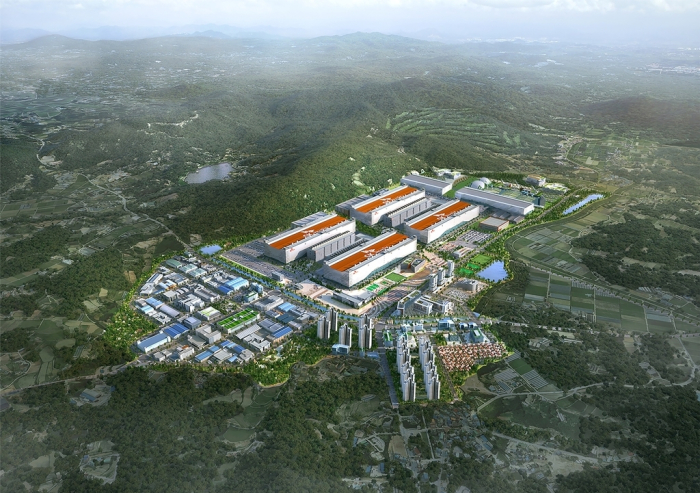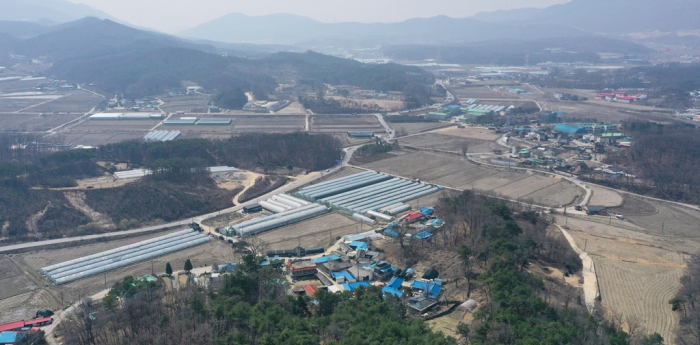Semiconductors
SK Hynix-led $101 bn Korean chip project delayed again
Korean chipmakers may lose competitiveness as bill for the industry will not be approved this month
By Sep 22, 2021 (Gmt+09:00)
6
Min read
Most Read
LG Chem to sell water filter business to Glenwood PE for $692 million


KT&G eyes overseas M&A after rejecting activist fund's offer


Mirae Asset to be named Korea Post’s core real estate fund operator


StockX in merger talks with Naver’s online reseller Kream


Meritz backs half of ex-manager’s $210 mn hedge fund



SK Hynix Inc.’s $101 billion project to build a semiconductor complex in South Korea was delayed again, stoking concerns that the world’s second-largest memory chip maker may lose competitiveness.
South Korean semiconductor industry may not be able to get the country’s supports sooner as lawmakers are unlikely to pass a bill this month including measures to foster the sector due to some disagreement with the government on details.
On the other hand, their global competitors are expanding capacity with helps from governments to capture the market of a supply shortage.
“The battle for supremacy among governments in the globe can narrow ‘the super gap’ widened by Korean companies at any time,” said Park Jea-gun, a professor at Hanyang University’s electronics engineering department. “The special law should be introduced as soon as possible,” Park said, referring to the bill.
LAND COMPENSATION
SK Hynix in 2019 announced that it decided to invest 120 trillion won ($101.4 billion) after 2022 to set up the cluster including four semiconductor fabrication plants in Yongin, about 50 kilometers south of Seoul. The complex will also be home to more than 50 manufacturers and suppliers of semiconductor materials, components and equipment.
The project has been, however, postponed five times so far due to prolonged process for land compensation, according to sources from the Yongin City government and the local chip industry on Sept. 22.
The construction may start in March and April next year, later than an earlier schedule of January in 2022 since talks over the land compensation was delayed to mid-October from June.
“About 60% of the residents who are living in the planned site barely managed to cooperate after refusing land evaluation and demanding ‘realistic’ compensation,” said a city government official. “The construction plan is inevitably postponed by more than three months.”
The project may be delayed further if negotiations over the compensation are extended. A compulsory purchase of the land is also possible, but it still takes more than six months.
That compared with SK Hynix’ plant construction in Wuxi City, Jiangsu Province, China in 2004 when it completed a factory in two years and four months after choosing a land.
Industry sources pointed out fundamental problems with South Korea’s land compensation system that enables owners to interfere investigations or refuse negotiations. A fine of up to 2 million won may be imposed if a land evaluation is obstructed without proper reasons, but the penalty is too low compared to compensations, they said.
“Residents will get few penalties of delaying a project as much as possible,” said Sungjin Kang, a professor at Korea University’s economics department. “In terms of game theory, the superior strategy is to first oppose and then procrastinate.”
Some companies gave up projects during land compensation process. SK Materials Co. last year planned to build a battery cathode material plant with an 850 billion won investment in Yeongju, 230 kilometers southeast of Seoul. But it decided to change the site to another city as it was expected to take at least three years for land compensation.

DELAYED SUPPORTS FROM GOVERNMENT
The parliament reached a deadlock over a bill for the local semiconductor industry that lawmakers aimed to approve this month due to disagreement on details with related ministries.
“We are considering whether to give up some provisions or persuade further,” Byun Jae-ill, a lawmaker of the ruling Democratic Party who is pushing for the bill, told The Korea Economic Daily in a phone interview. “It looks difficult to pass it this month.”
Despite a consensus on the need to foster the industry, some opposed the bill, for example, as it aims to ease the quota restrictions on colleges in Seoul and surrounding areas to increase manpower for the industry. That would weaken competitiveness of universities in other regions, the opponents argued.
A measure to speed up approvals on semiconductor chemicals was temporarily suspended. The plan aims to move government officials including ones from the environmental ministry and affiliated agencies to areas nearby industrial complexes in order to license chemicals used in the development of new semiconductor materials more quickly. It usually takes three months to get such endorsements in South Korea, much longer than about one month in other countries, according to the industry. Officials of the related ministries opposed the step.
“We will decide detailed directions of the special law through an agreement within the party after the Chuseok holidays,” Byun said, referring to the local holidays from Sept. 20 to Sept. 22.

RUNNING COMPETITORS
While South Korean chipmakers are struggling with such issues, their global competitors are moving quickly to expand market shares with supports from governments in the globe.
Taiwan Semiconductor Manufacturing Co. (TSMC), the world's largest contract chipmaker, plans to build two factories to produce 12 inch wafers in Kaohsiung, according to industry sources. The new plants are known to manufacture central processing units (CPU) and graphics processing units (GPU) for Advanced Micro Devices Inc. (AMD) and Nvidia Corp, as well as application processors (AP) for MediaTek Inc. TSMC is also understood to produce 6- and 7-nanometer semiconductors.
The company is predicted to keep increasing capacity, given a plan unveiled in April to invest $100 billion by 2023 for capacity expansion at home and abroad.
Intel Corp. announced earlier this month that it could invest up to 80 billion euros ($93.9 billion) in Europe over the next decade to boost the region's chip capacity as it aims to enhance its foundry competitiveness. Leaders in Europe including Germany, France and Italy proposed various incentives to Intel CEO Pat Gelsinger in a move to attract the investment.
In March, Intel said it plans to spend $20 billion for two plants in Arizona, the US, and another $3.5 billion for an expansion of a New Mexico factory.
The global semiconductor industry is forecast to invest a record $90 billion in production equipment and facilities this year, according to a recent report from Semiconductor Equipment and Materials International (SEMI). The investment is expected to increase further to $100 billion in 2022.
“A semiconductor shortage will be a good chance for chip makers to expand market shares. Competition for new customers will intensify by expanding production lines,” said an industry source.
Write to Su-Bin Lee and Sin-Young Park at lsb@hankyung.com
Jongwoo Cheon edited this article.
More to Read
-
 Intel to Invest Up to $95 Billion in European Chip-Making Amid U.S. Expansion
Intel to Invest Up to $95 Billion in European Chip-Making Amid U.S. ExpansionSep 08, 2021 (Gmt+09:00)
4 Min read -
 Foundry competitionIntel’s jump into foundry sets off alarm bells for Samsung, TSMC
Foundry competitionIntel’s jump into foundry sets off alarm bells for Samsung, TSMCMar 24, 2021 (Gmt+09:00)
3 Min read
Comment 0
LOG IN


